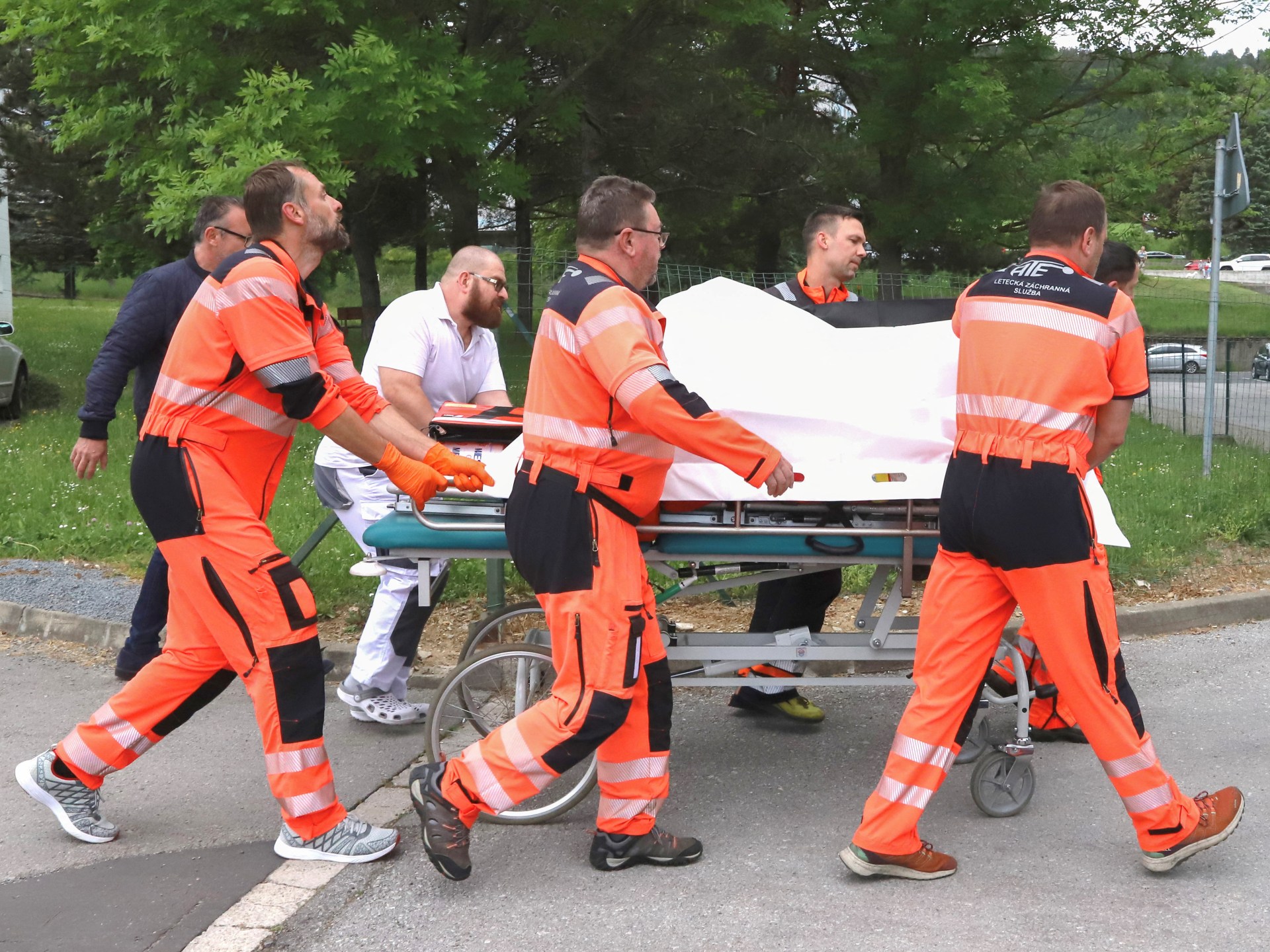
Saturday’s attempt on US presidential candidate Donald Trump’s life sent shockwaves across the world. In its aftermath, commentators have pointed to the growing polarisation in the United States and the former president’s divisive rhetoric.
Playing on people’s fears and encouraging hatred may be effective populist tools, but they also tend to backfire. Slovaks know this all too well, having experienced the shock of their own Prime Minister Robert Fico’s assassination attempt, amid his polarising third term in office.
Just two months ago, a 71-year-old self-described poet and security guard fired several shots at the prime minister at close range in the town of Handlová as he was walking out of a meeting. The assailant was reportedly motivated by his disagreement with the Fico government’s media and foreign policies.
In the aftermath of the incident, cross-party condemnation of political violence was not enough to bridge the deep divide between Fico’s conservative, pro-Kremlin base and the opposition’s pro-Ukraine, progressive-liberal supporters.
Just like in the US, where now Republicans are blaming Democrats for the attempt on Trump’s life, high-level government officials in Slovakia were quick to accuse the media and the opposition of inciting the assailant.
The ruling coalition used the incident as a pretext to double down on policies it was already pursuing despite the fact that they were polarising society. This, combined with continuing divisive rhetoric from Fico and his allies, threatens Slovak democracy and political stability.
In February, the government passed controversial amendments to the Criminal Code, eliminating the Special Prosecutor’s Office responsible for investigating serious criminal offences of corruption and collusion with criminal groups. Other provisions shortened the statute of limitations on economic crimes and abolished some economic offences. This move was largely perceived as an attempt to undermine the rule of law to protect figures close to Fico.
In March, the cabinet took bold steps to restructure public broadcasting, undermining media independence and flouting European Union rule of law standards. In an express legislative procedure, it proposed a novel media bill to replace the existing public broadcasting group with a new entity, whose director-general and programme content could be influenced by the government.
These policies were seen as a major blow to the country’s democratisation process and sparked large protests in Bratislava as civil society and the opposition expressed concerns that Fico was steering the country in the direction of Prime Minister Viktor Orbán’s Hungary.
After the assassination attempt, Fico and his government continued in the same polarising direction.
In early June, while still recovering, the prime minister made a video address blaming the assassination attempt on the “unsuccessful and frustrated” opposition, warning that if his political rivals continue “on their current path”, there would be “more victims”.
His allies and coalition partners have also continued to attack the opposition and its supporters. Recently, for example, government officials accused former Defence Minister Jaroslav Nad of “treason” and “sabotage” and launched an investigation against him for providing fighter jets and air defences to Ukraine.
Fico’s government has also sought to further curb popular protests. In June, it introduced to parliament a set of legislative changes known as “Lex Assassination”, which prohibit protests near public figures’ homes and the various seats of power or in the cases where an individual’s privacy would be infringed. The legislation also endows certain officials, including the serving prime minister, with a lifetime financial annuity, use of state property, security and other benefits.
The Lex Assassination, which was passed in a hurried fashion, de facto increases the personal gain of public officials and stifles citizens’ right to free assembly under the pretence of improving public order and national security.
Fico’s cabinet has also maintained polarising rhetoric even at international fora. At the end of May, it refused to endorse amendments to the International Health Regulations that were negotiated under the sponsorship of the World Health Organization (WHO) to help boost the world’s pandemic preparedness. Slovakia is the only country to reject them. In June, National Party MP Peter Kotlár, who represented Slovakia at the WHO negotiations, declared there had been no pandemic.
In a country that is already prone to polarisation and belief in conspiracy theories, the policies and rhetoric of Fico’s government only fuel them further. The consequences can be dire. Pandemic denialism feeds into the erosion of trust in scientific and medical institutions, which can have deadly repercussions come the next pandemic. It should also be alarming that in a recent survey, about 20 percent of respondents said they did not believe the Earth is round.
Polarising rhetoric can also be dangerous. The assassination attempt illustrates the extent to which political discourse in Slovakia has degraded, teetering on the edge where violence is deemed a legitimate form of expression.
Meanwhile, the opposition is in a delicate position to challenge Fico’s power-grabbing ambitions and freedoms-curbing policies. Having been blamed for the assassination, it has to tread carefully as any criticism of the prime minister and his allies may be spun as further attacks on the nation.
But domestic polarisation and political violence are dangerous not just within the borders of the country, as the cases of both Slovakia and the US illustrate. They can also have a destabilising effect on allies and neighbours.
Populists like Fico and Orbán undermine the EU’s strength and effectiveness in pushing through critical policies. That the Orbán-led hard-right political faction Patriots for Europe has become the third leading force in the European Parliament hardly bodes well for the union.
That is why the EU should play a more proactive role in challenging Fico’s media policies, changes to the penal code and judiciary reforms. It can do so by applying the same tactics it has with Hungary – withholding funds.
Brussels should also support Slovak media and civil society in combating misinformation, falsehoods and hate speech online and offline. Support from European partners and the global community will be indispensable in ensuring that the current political turbulence is merely a temporary setback on the path to Slovakia’s long-term democratisation, rather than a permanent and dangerous deviation.
The views expressed in this article are the author’s own and do not necessarily reflect Al Jazeera’s editorial stance.
EMEA Tribune is not involved in this news article, it is taken from our partners and or from the News Agencies. Copyright and Credit go to the News Agencies, email news@emeatribune.com Follow our WhatsApp verified Channel





